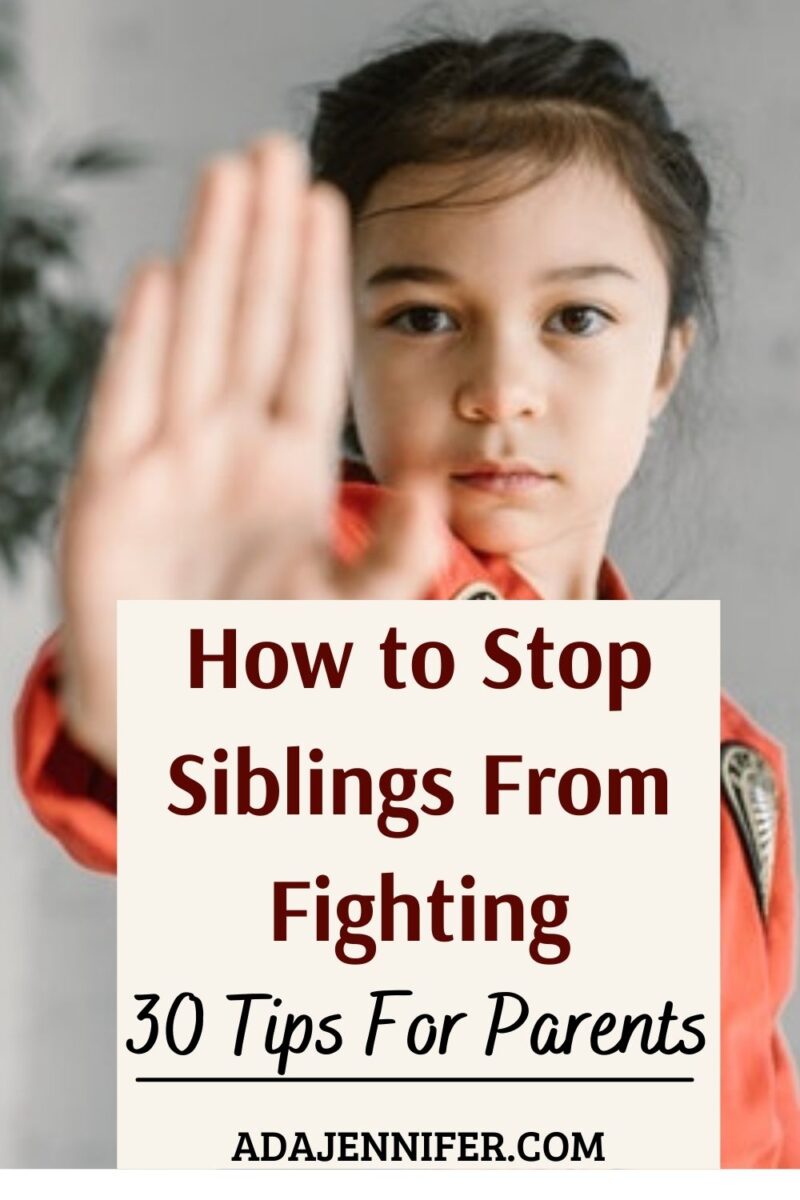How To Stop Siblings From Fighting- 30 Tips For Parents

One of the top questions that runs through the minds of most parents with kids is- how to stop siblings from fighting.
Are you tired of listening to your kids argue every minute of every day? Irrespective of how hard you try, you just can’t seem to understand why they don’t get along as siblings?
Most parents have to face this kind of situation at least once in their parenting lives. We’re here to let you know how you can handle these situations and what you can do to keep the peace in your house.
Sibling rivalry— the constant arguments or even physical fighting can be exhausting to handle. Conflicts are a part of every family, but they can become a big issue when out of hand. Since a certain amount of bickering and arguing between kids is normal, it can be confusing for parents to understand when to intervene.

What Causes Sibling Fights?
To know how to stop siblings from fighting, it is first of all important to know the causes of these fights. Children may fight due to many issues, and they may do so because they’re hungry, sleepy, or even just want attention from their parents.
Of all the problems that present themselves during parenthood, sibling fights may be stressful, particularly harmful to the parents’ mental health.
According to some experts, the root cause of sibling fights is competition. Competing for parents’ love and attention is the goal of a child when they are young. As the need for parental approval and recognition grows, so might the rivalry between siblings. Siblings can show rivalry in many ways, which can be in the forms of:
- Excessive teasing and name-calling
- Telling on/snitching on each other
- Excessive verbal arguments
- Physically hurting each other
- Breaking/tearing or causing any kind of harm to the others’ belongings
While the competition for love and attention is the main reason behind sibling fights, many more causes contribute to this.
Eight possible Reasons for Sibling Rivalries:
1. The child’s identity:
When children are young, they often try to define themselves as individuals, giving them a sense of identity. When they seem to be discovering new talents and interests, they can get frustrated trying to stand out among their siblings. To establish a sense of individuality, they might get into fights with their siblings.
2. Inequality between children:

Suppose a child feels that they are not getting enough parental love and affection as their sibling. In that case, they may simply get into fights to divert the parents’ attention towards themselves.
The feeling of inequality doesn’t only cause conflicts but increases resentment and envy between kids. Sometimes, parents might not notice their actions and the amount of love they share with their child.
If your kid is feeling inadequately loved, ensure that you make them feel loved immensely without any inequality. A child grown with less love will go through multiple mental crises, including self-esteem issues, lack of self-appreciation and self-love, no inner voice in the crowd, trust issues, etc.
3. The arrival of a new family member:
A child may sometimes feel threatened because there is now a new member in the family. The fear of sharing their space, love, toys, and attention with their new sibling may sound like a foreign (unacceptable) concept to your kids.
4. Development:
Going through physical and mental changes can affect children in how they view things and how okay they are with sharing their parents’ love and attention with their siblings. The following are perfect examples of these sorts of changes.
- Upgrading to a new class/subject
- Teenage hormones
- Social and school pressure
- Personality changes— introvert/extrovert behavior, shyness, expression issues, etc.
- puberty
- Stage performance.
- Girlfriend/boyfriend issues.
As parents, it’s our responsibility to ensure that our kids are not dealing with mental pressure. Don’t dismiss your kid’s emotions and problems as something juvenile. No, be attentive and help them get over that particular concern or dilemma.
5. Hunger or boredom:
Sometimes children may start fights simply because they are hungry or have nothing else to do. When this is the case, it might be more common for children to get into play fights instead of serious ones.
6. Household dynamics

Your kids are receptive to their surroundings and actions. If they witness chaotic household, fights, and stress, they will respond accordingly.
7. Aggressive parents:

Young minds are easy to mold and influence, and children look up to their parents and model their behavior. If you’ve made it seem like excess aggression is okay while fighting, your children may reflect the same kind of behavior and even think of it as normal.
8. Stress:
Stress can significantly contribute to fights in families. If the parents are dealing with a stressful situation, they might start giving their children less attention causing an increase in problematic behavior.
Similarly, a child coping with stressful situations might try to release the frustration by inflicting anger and frustration on their siblings. Younger siblings may often become targets of scapegoating. To provide a toxic-free environment to your kids, you must try to create a positive surrounding that’s free of stress and violence. It might get tough, but parenting has never been easy.
How to Stop Siblings From Fighting?
30 Sibling fighting solutions and Tips:
There are many ways to deal with sibling conflict. Here is a list of 30 tips that will guide you on how to stop siblings from fighting:
1. Look after them

Paying attention showing love, and admiration for each of your children is the easiest way to avoid conflict. It will make your kids happier and calmer in life.
Suppose the child feels secure in their relationship with you. In that case, the arrival or existence of another sibling may not affect them as much.
2. Understand their individual needs
Each of your children may have different needs, and that is okay. As a parent, you must fulfill each of their needs to the best of your ability.
3. Place your children’s needs first.
Sometimes as parents, you might have to give up on your precious alone time, but it’s only for a while. Children grow up in the blink of an eye, so make sure you’re there to attend to them whenever they need you around.
4. Set rules
Rules can be good between siblings that seem to quarrel or bicker a lot. For example, you may set a specific amount of time until each of the children can watch the TV or play the video game. This strategy goes a long way in avoiding conflict.
5. Establish clear and firm boundaries
Boundaries are essential if you want to have a healthy relationship with your kids and you also want them to have a healthy relationship with themselves.
Teach your kids to maintain and respect boundaries. Don’t just border boundaries between two siblings, but ensure those boundaries in parent-child relationships as well. Explaining the importance of boundaries at a young age will aid lesser quarrels and fights between siblings.
6. Routines
Setting up a routine will make parenting easier; trust us on this one. Many disagreements are avoided when kids follow a pattern and know what is to be done.
7. Praise them
When your child has been doing well and avoiding fights between themselves and their siblings, be sure to tell them that you’re noticing a positive change. This will help reinforce good behavior in the child.
8. Provide encouragement
Like praising children, a parent must provide the child with words of encouragement. Encouragement helps boost self-esteem in young kids, helping them feel secure in all their social relationships.
9. Share values
Share values that you want them to learn. Tell them you want them to be more caring and loving towards each other. Sometimes, simply communicating can do wonders. To teach your child compassion and empathy, visit orphanages, pet cafes, old-age homes, and donate (toys or warm clothes, etc.) Teach your kids to share, not just with siblings but also with people in need.
10. Model these values
Model the values you want your child to learn. If you want your child to grow up to be an independent person, you must portray independence in your lifestyle. Similarly, if you want your child to be kind towards their siblings, you must show kindness in all your relationships and interactions.
11. Team Sports
Team sports and other team-building activities will help your child understand the importance of coordination and sharing. This will, in turn, promote healthy sibling relationships as the child will look at the family as a team.
12. Don’t hesitate to step in when things get heated.

If you think you have ways to help your child calm down during a fight, you must not hesitate to step in and help keep the peace. As soon as you notice your children having trouble working together, you may point it out by saying something like, “Can you come up with a way where both of you can take turns with this?”
13. Talk things over
This tip will work well, especially if your child is a little old. Talk to them after a fight and ask them if there was another way of dealing with the problem.
14. Promote positive ways of expressing feelings
Teach your children healthy ways to cope with negative feelings like stress or frustration. Teach them not to react immediately when they feel extreme anger and hatred towards their siblings. Show them the power of communication and forgiveness.
15. Define ‘respectful disagreeing.’
Teach your child that it is okay to disagree with people on topics and that disagreement doesn’t always equate to disrespect.
16. Teach them social skills
Teach your child social skills such as sharing and cooperating. Teach them how to follow directions and how to respect personal space. Teaching them young will go a long way in minimizing sibling rivalry in the future.
17. Create a sense of equality
Never let your child feel unequal to their siblings. For example, if you decide to buy a toy for one child, make sure the other child has enough toys too or buy them one too, so they don’t feel overlooked or ignored.
18. Come up with reinforcers.

Come up with positive reinforcements for your child to make them get along better. For instance, set a rule that you will take them to the park in the afternoon if they don’t fight in the supermarket. This way, you’ll make sure they’re always on their best behavior and avoid fights as far as possible.
19. Give them their space.

If you have the choice, give the children their own space and let them have their alone time. A sense of individuality will flourish when kids have their own space, but make sure they feel secure with the area around them and not abandoned.
20. Keep them close
If you’re aware that your children seem to get into fights often, make sure you’re always around to intervene in case things escalate. Be mindful of where they are and what they’re doing at all times.
21. Assign roles

If your children have trouble working together on tasks, give them specifications and mention their jobs in detail, so there is no room for confusion and misunderstandings. For example, while visiting the supermarket, tell one child to push the trolley, read the grocery list, and the second child to find the items.
22. Create distractions
In cases where fighting seems inevitable, you can create distractions to help avoid things from getting worse. Tell your kid to do something else as soon as you notice them fighting over something trivial.
23. Get an adult/older child to help out.
If you’re busy with something else or cannot intervene in the fight for whatever reason, get another adult to help you out. If your children seem to fight in the backseat of your car while you’re driving, make an older child/adult sit in the middle.
24. Let them
This tip might seem controversial to some people. Still, if you notice your kids arguing at an average pace and know that the argument is at a healthy rate, you can let them. If you must intervene, you can provide feedback that will help improve their communication skills.
25. Rhetorical questions
Rhetorical questions are simple ‘yes or no’ questions that will help your children reevaluate their behavior and choices during an unhealthy argument. Say something like, “Do you believe this was the best way to handle this situation” or “Was there anything else you could do in that situation?”
When you ask questions like these, the kids will take some time to reflect on their actions and be careful to not repeat them. This also avoids pointing fingers or playing the blame game among siblings.
26. Give timely reminders
Gentle and timely reminders about house rules can go a long way in minimizing sibling fights and avoiding unnecessary arguments. Reminders such as “You know you’re not supposed to be doing that” work well.
27. Listen to each side.
Listen to what each of them has to say and understand their perspective. Venting to a parent will often help calm things down between sibling fights.
28. Teach constructive ways of dealing with problems
Encourage your child to not engage in harmful patterns such as name-calling or teasing. Instead, teach them ways to listen to each other and understand where their sibling is coming from. Teach them to negotiate and find a middle ground to reach a mutual agreement and find solutions for problems.
29. Hug it out
If you catch your kids getting into a fight, ask them to hug it out. This will make them feel loved and create an emotional connection with each other. If the argument/ fight stems from anger, hugging will help them feel better instantly and calm things down.
30. Make them work together.
Sometimes, making your children work in sync will create coordination and promote the positive values of teamwork and understanding between them. For example, if you think they get into fights a lot, ask them to work on a puzzle together. In this manner, they will form a better emotional bond by working together physically.
Sibling Fighting

If you have more than one child, chances are they have gotten into multiple arguments by now, and you’ve always had to play referee. No matter how strong the bond between two siblings is, it’s entirely normal for them to get into fights with each other.
There can be moments where they feel the friction between themselves or disagree to such a great extent that it turns into a fight. But what if we were to tell you that sibling harmony is not as tough to achieve as it might seem. Don’t believe us? Let us tell you how! Many times, siblings don’t get along for whatever reason. In cases like this,
- parents need to know of conflict resolution strategies to help calm things down
- and find solutions to issues the kids face while adjusting to each other’s presence.
How can sibling harmony be established?
Sibling harmony means lesser fights for you to referee. When a good bond is shared between siblings from a young age, and the children are taught how to manage conflict from a young age, there can be fewer arguments and rivalry between them. This ultimately helps strengthen the family bond and allows all family members to grow closer.
Pros:
While all parents dream of a peaceful home, sibling rivalry is quite common among children of one family. It is a natural part of growing up. The plus point to this is that it teaches kids a lot and has advantages such as learning and mastering the social skills of negotiation and compromise.
Cons:
Sibling rivalry, if left unattended,
- may turn into an issue with long-lasting impacts such as lower esteem
- has a greater risk of being diagnosed with depression and anxiety
- enables toxic relationship resulting in mental and physical damage
Also, Siblings who get into quarrels are often more likely to engage in drug abuse and delinquent behaviors well into adulthood.
Frequently Asked Questions
Two of the most frequently asked questions relating to sibling fights are:
Is it normal for siblings to fight non-stop?

While sibling fighting is common and even inevitable to a certain extent, it is not normal for siblings to fight continuously and every day. Some kids may become best friends at a young age and share a strong emotional bond from the start; others may take some time to do so. There is nothing wrong with that.
As children grow, their needs evolve, and temperaments change. The kind of relationship a child shares with their sibling may depend upon the child’s type of temperament.
Every child may be different in how they deal with issues amongst themselves. A laid-back kid may avoid conflict altogether, while a child with an easily rattled personality may like to get into arguments often. Children take their time to adjust to each other’s presence, and while doing that, they must be allowed the time and space they might require to process it.
There is also professional help available for kids that seem to have trouble adjusting with siblings and dealing with conflict in a healthy manner.
What to do when one sibling hates the other?
Most siblings can experience some amount of jealousy and hatred towards each other. They may compete in unhealthy ways and end up disliking each other’s company. This does not necessarily have to mean that they hate each other. Since there can be various reasons why siblings don’t seem to get along.
The best approach to trying to resolve conflict is by addressing it. Address issues directly and ask your children to confront each other about their problems in your presence. When you realize where the problems stem from, help your kids work with each other to find solutions to their problems.
In Conclusion
Remember that siblings get into fights to get their parents’ attention more often than not. If you think this could be the case, now that you have read the tips on how to stop siblings from fighting, start practicing what you have read by making sure you make time for your children and let them know they are loved and valued every chance you get.
It is best to only intervene in sibling fights in extreme danger or physical harm cases. For the most part, let your kids deal with issues on their own so they can learn how to navigate conflicts and find healthy solutions to problems. If you always intervene and stop fighting, they may become dependent on you to prevent them from fighting every time.
If you feel like you’re having trouble managing conflicts between your kids, you can always consult a professional and ask them for help. Trained mental health professionals know the harmful effects conflict can have on kids, physically and emotionally. They can help you or your kids by giving them proper guidance and techniques for conflict resolution.
Save This For Later!

